Articles
- Page Path
- HOME > J Korean Acad Nurs > Volume 40(4); 2010 > Article
-
Original Article
- Development of a Web-based Education Program for Nurses working in Nursing Homes on Human Rights of Older Adults
- Ki-Kyong Kim
-
Journal of Korean Academy of Nursing 2010;40(4):463-472.
DOI: https://doi.org/10.4040/jkan.2010.40.4.463
Published online: August 31, 2010
Associate Professor, Department of Nursing, Wonju College of Medicine, Yonsei University, Wonju, Korea.
- Address reprint requests to: Kim, Ki-Kyong. Department of Nursing, Wonju College of Medicine, Yonsei University, 162 Ilsan-dong, Wonju 220-701, Korea. Tel: 82-33-741-0380, Fax: 82-33-743-9490, kyongkk@yonsei.ac.kr
• Received: March 3, 2010 • Accepted: August 9, 2010
Copyright © 2010 Korean Society of Nursing Science
Abstract
-
Purpose
- This study was done to develop a web-based education program for nurses working in nursing homes. The focus was on the rights of older adults.
-
Methods
- The program was designed based on the Network-Based Instructional System Design (NBISD) model and was operated and evaluated between July 2007 and June 2008.
-
Results
- Out of nursing records of 40 residents from a nursing home, the final 7 cases were deducted through classification using the Resource Utilization Group (RUG)-III. The data on needs for education was collected from 28 nurses working in 15 nursing homes located in Seoul and Gyeonggi Province, who agreed to complete a self-report questionnaire. A comprehensive review of the literature and two focus groups interviews were used to search for risk factors and guidelines for protection of human rights. The education program was developed based on Kolb's experiential learning model and composed of 5 units, which included content on types of human rights and rights to death with dignity, elder abuse, physical liberty, and self-determination. The program was positively evaluated showing a score of 3.35 (SD=0.37) out of 4.
-
Conclusion
- The educational program developed in this study should promote nurses' sensitivity to the rights of elders and improve nurses' behaviors in protecting the rights of elders residing in nursing homes.
This work was supported by the Korea Research Foundation Grant funded by the Korean Government (MOEHRD, Basic Research Promotion Fund) (KRF-2007-313-E00557).
- 1. Baillie L. The impact of urological conditions on patients' dignity. International Journal of Urological Nursing. 2007;1:27–35.Article
- 2. Choi JS, Kim KS. Application and evaluation of a web-based education program on blood-borne infection control for nurses. Journal of Korean Academy of Nursing. 2009;39:298–309.ArticlePubMed
- 3. Chung HJ. Development and effectiveness of hemodialysis nursing education program using web-based learning system. 2000;Seoul, Yonsei University. Unpublished master's thesis.
- 4. Gallagher A, Seedhouse D. Dignity in care: The views of patients and relatives. Nursing Times. 2002;98:39–40.
- 5. CMS's RAI Version 2.0 Manual. Health Care Financing Administration. 2007;Retrieved March 3, 2008. from http://www.cms.hhs.gov.
- 6. Ishay MR. The History of human rights: From ancient times to the globalization Era. 2004;Berkeley, Univ of California Press.
- 7. Jacelon CS. The dignity of elders in an acute care hospital. Qualitative Health Research. 2003;13:543–556.ArticlePubMedPDF
- 8. Jung IS. Understanding of distance education. 1999;Seoul, Koyyuk Science Company.
- 9. Jung KH. The Case study of human rights in nursing home. 2002;Seoul, National Human Rights Commission.
- 10. Jung YM. Development of a web-based senescence preparation education program for successful aging for middle-aged adults. Journal of Korean Academy of Nursing. 2008;38:831–842.ArticlePubMed
- 11. Kim EK, Park HY, Kim CY. On the feasibility of a RUG-III based payment system for long-term care facilities in Korea. Journal of Korean Academy of Nursing. 2004;34:278–289.ArticlePubMedPDF
- 12. Kim KK. The nurses' perceptions and experiences on the older adult's dignity in nursing homes. Journal of Korean Academy of Nursing Administration. 2009;15:81–90.
- 13. Kolb D. Experiential learning: Experiences as the source of learning and development. 1984;NJ, Prentice-Hall, Inc.
- 14. National elder abuse data. Korea Elder Protection Agency. 2008;Retrieved March 2, 2010. from http://www.noinboho.org/sub_02/02_05_05.php.
- 15. Kwon YM. The development and evaluation of web-based nursing educational program. Journal of Korean Academy of Nursing Administration. 2006;12:41–51.
- 16. Matiti MR, Trorey G. Perceptual adjustment levels: Patients' perception of their dignity in the hospital setting. International Journal of Nursing Studies. 2004;41:35–44.
- 17. National guidebook for health, welfare service for the older adults. Minister for Health, Welfare and Family Affairs. 2010;Retrieved March 2, 2010. from http://www.mw.go.kr/front/jc/sjc0603vw.jsp.
- 18. North American Nursing Diagnosis Association International. Nursing diagnosis: Definitions & classification 2007-2008. 2007;Philadelphia, PA, NANDA.
- 19. Oh I. Human rights education process incorporating experiential learning theory and web-based instruction. Research in Corporate Education. 2005;7:75–93.
- 20. Park S. A Integrated approach to human rights education. Theory & Research in Citizenship Education. 2003;35:115–141.
- 21. Park SI, Lee SM. The effect of education program for the human rights. The Journal of Educational Research. 2000;38:185–205.
- 22. 2009 Da 17417 Removal of futile life-sustaining treatment. Supreme Court of Korea. 2009;Retrieved March 21, 2010. from http://eng.scourt.go.kr/eboard/.
- 23. Walsh K, Kowanko I. Nurses' and patients' perceptions of dignity. International Journal of Nursing Practice. 2002;8:143–151.ArticlePubMed
- 24. Yoo SH, Kang SA. Nursing home staffs' knowledge on the 2004 revised older Koreans act for abuse, reports of elder abuse and attitudes about sanctioning mandatory reporters. Social Welfare Policy. 2008;33:311–333.
- 25. Yoon SJ. Effects of case design method in Web-case based learning environment. The Korea Journal of Education Methodology Studies. 2006;18:201–219.
- 26. Yu BY. Moral education. 2004;Seoul, Yswpub.
REFERENCES
Figure & Data
REFERENCES
Citations
Citations to this article as recorded by 

- Factors influencing intention to intervene in elder abuse among nursing students
Hee-Jeong Kim, Min-Sook Seo, Dahye Park
PeerJ.2021; 9: e12079. CrossRef - Lapnurse—A Blended Learning Course for Nursing Education in Minimally Invasive Surgery: Design and Experts’ Preliminary Validation of Its Online Theoretical Module
Juan Francisco Ortega-Morán, Blas Pagador, Juan Maestre-Antequera, Javier Sánchez-Fernández, Antonio Arco, Francisco Monteiro, Francisco M. Sánchez-Margallo
Healthcare.2021; 9(8): 951. CrossRef - Validation of the online theoretical module of a minimally invasive surgery blended learning course for nurses: A quantitative research study
Juan-Francisco Ortega-Morán, Blas Pagador, Juan Maestre-Antequera, Antonio Arco, Francisco Monteiro, Francisco M. Sánchez-Margallo
Nurse Education Today.2020; 89: 104406. CrossRef - A Study on Caregiver's Perception of Restraints
Hye-kyung Kang
Journal of the Korea Academia-Industrial cooperation Society.2016; 17(5): 452. CrossRef - Interventions for preventing abuse in the elderly
Philip RA Baker, Daniel P Francis, Noran N Hairi, Sajaratulnisah Othman, Wan Yuen Choo
Cochrane Database of Systematic Reviews.2016;[Epub] CrossRef - A Study on Visiting Caregiver's Perception of Elder Abuse
Chung-uk Oh, Hye-kyung Kang
Journal of the Korea Academia-Industrial cooperation Society.2016; 17(4): 638. CrossRef - Development and Evaluation of a Web-based Simulation Program on Patient Rights Education using Integrated Decision Making Model for Nurse Students
Ki-Kyong Kim
Journal of Korean Academy of Nursing Administration.2014; 20(2): 227. CrossRef - Development of Cinenurducation Based on Kolb's Experiential Learning Model for Understanding Child Growth and Development.
Jina Oh, Mihae Im, Hyerin Roh
Child Health Nursing Research.2014; 20(2): 96. CrossRef - Development and Evaluation of a Web-based Education Program for Nursing Students on Control of Vancomycin-resistant Enterococcus Infection
Ju Gong, Ji-Yeon Kang
Journal of Korean Academy of Fundamentals of Nursing.2012; 19(1): 122. CrossRef
Development of a Web-based Education Program for Nurses working in Nursing Homes on Human Rights of Older Adults
Development of a Web-based Education Program for Nurses working in Nursing Homes on Human Rights of Older Adults
Types of Rights of Older Adults and Content
Cases Classification According to RUG-III Category
ADL=activity of daily living.
Risk Factors for Compromised Older Adult's Rights and Needs for Learning
The Process and Contents of Program
Program Evaluation, (N=27)
Table 1
Types of Rights of Older Adults and Content
Table 2
Cases Classification According to RUG-III Category
ADL=activity of daily living.
Table 3
Risk Factors for Compromised Older Adult's Rights and Needs for Learning
Table 4
The Process and Contents of Program
Table 5
Program Evaluation, (N=27)
 KSNS
KSNS
 E-SUBMISSION
E-SUBMISSION
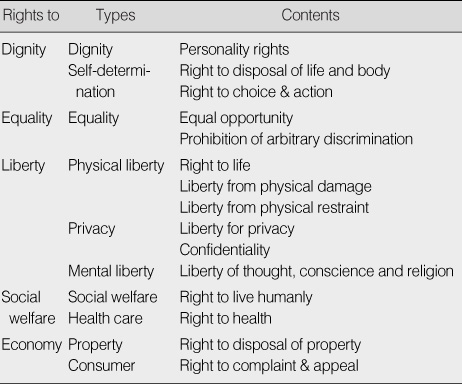
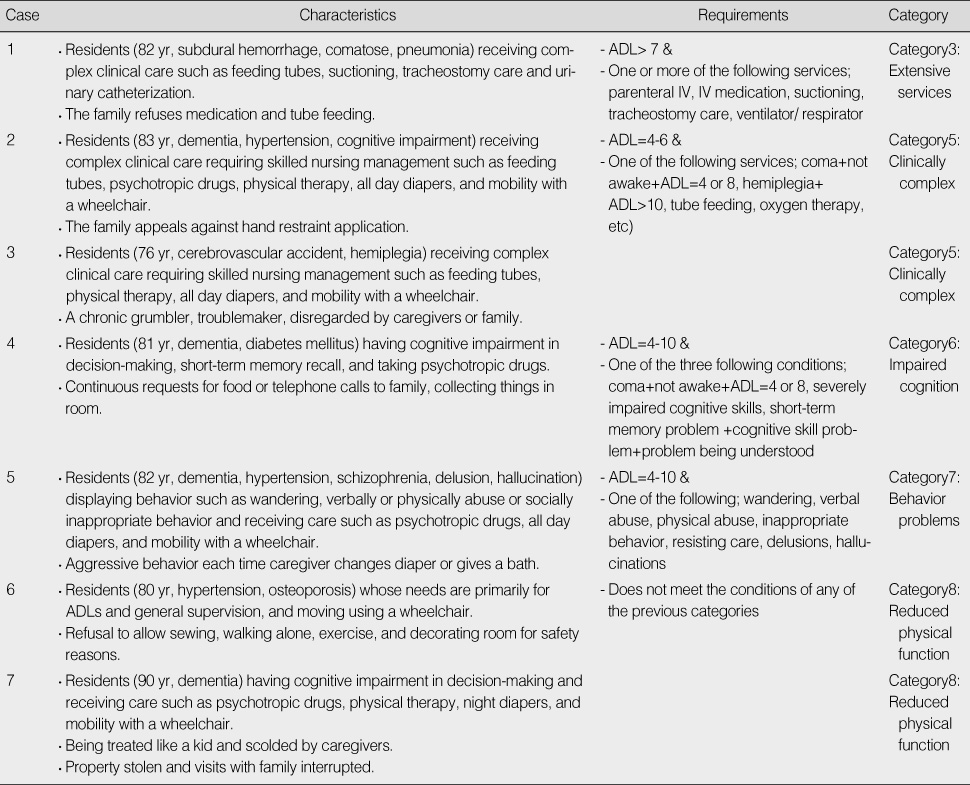
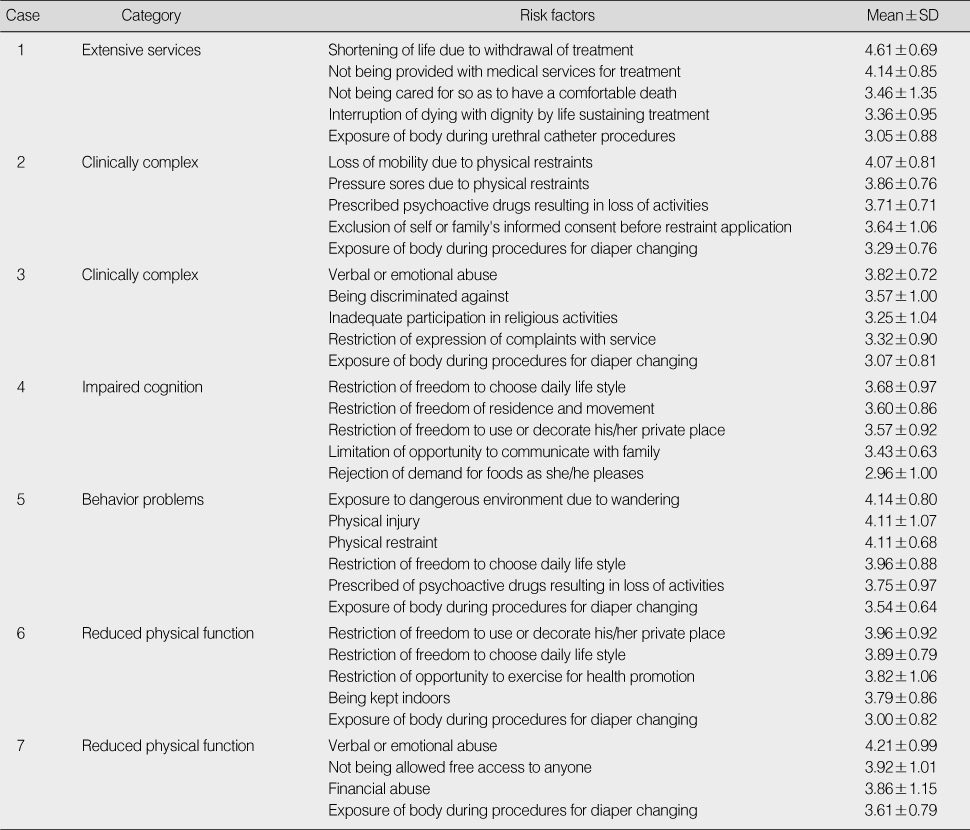
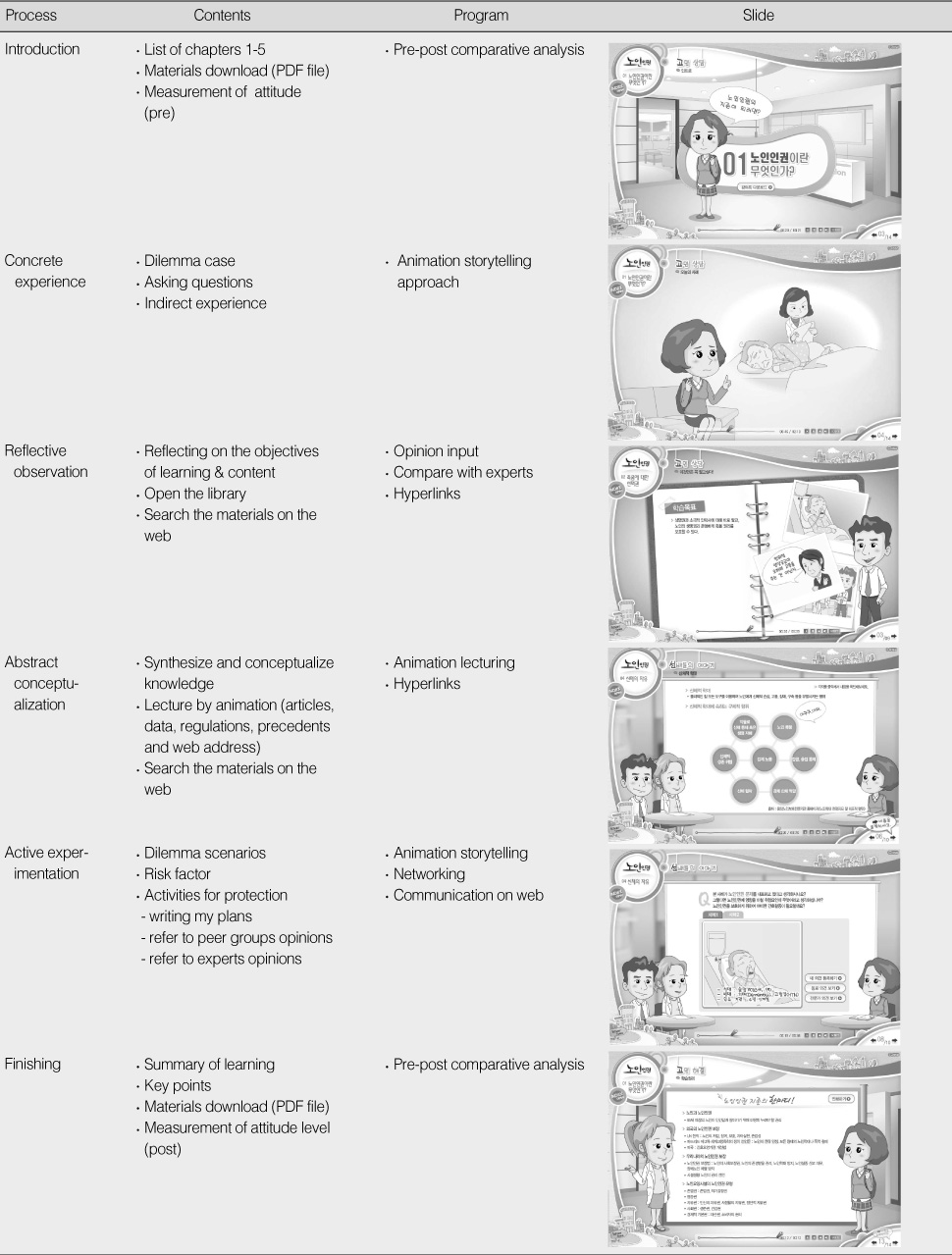
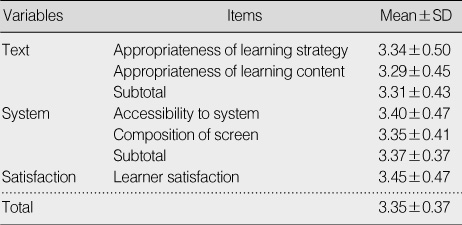
 Cite
Cite

